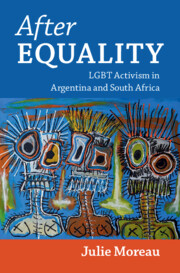Book contents
- After Equality
- Cambridge Studies in Gender and Politics
- After Equality
- Copyright page
- Dedication
- Contents
- Acknowledgments
- Introduction
- 1 Intersectionality and the Strategic Use of Identity in Social Movements
- 2 Identity in Context
- 3 Making Identity Work
- 4 Dilemmas of Success
- 5 In the Flesh
- 6 Intersectionality, Identity Strategizing, and the Future of LGBT Inclusion
- Appendix: Methodological Choices
- References
- Index
Introduction
Published online by Cambridge University Press: 19 June 2025
- After Equality
- Cambridge Studies in Gender and Politics
- After Equality
- Copyright page
- Dedication
- Contents
- Acknowledgments
- Introduction
- 1 Intersectionality and the Strategic Use of Identity in Social Movements
- 2 Identity in Context
- 3 Making Identity Work
- 4 Dilemmas of Success
- 5 In the Flesh
- 6 Intersectionality, Identity Strategizing, and the Future of LGBT Inclusion
- Appendix: Methodological Choices
- References
- Index
Summary
This chapter introduces the book’s motivation: to understand how activists use identity to manage the apparent contradiction between the promises of legal inclusion and persistent forms of marginalization. The chapter illustrates the importance of the issue through discussion of the activism of two lesbian groups – Free Gender in Cape Town, South Africa, and La Fulana in Buenos Aires, Argentina – that form the focus on the book. Both organizations strategize sexual identity in tandem with other racial, class, and gender identities, albeit in different ways. The chapter presents the conceptual background of the book, which adopts a historical approach to understanding LGBT inclusion into citizenship and explains the relevance of intersectionality to contemporary LGBT organizing. The chapter previews the theoretical framework developed in Chapter 1 that accounts for key differences in how the two organizations strategically use multiple identities. The chapter concludes with a discussion of some of the methodological aspects of the research and presents the plan for the rest of the book.
Keywords
Information
- Type
- Chapter
- Information
- After EqualityLGBT Activism in Argentina and South Africa, pp. 1 - 21Publisher: Cambridge University PressPrint publication year: 2025
